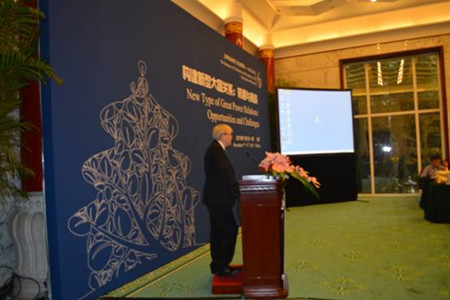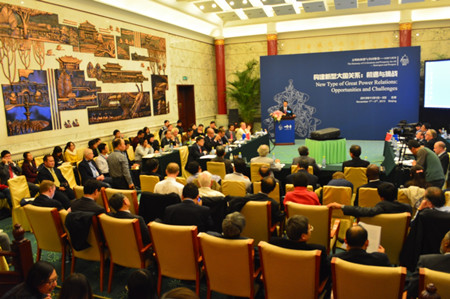Peking University, Nov. 5, 2013:“The fact that we are now here in Beijing today talking about this is better than the alternative–this is progress,” said Kevin Rudd, former prime minister of Australia, during his speech in the first session of “New Type of Great Power Relations: Opportunities and Challenges”, a panel of the Beijing Forum 2013 in Diaoyu State Guest House on November 1, 2013.
Kevin Rudd, whose Chinese name is Lu Kewen, is a foreigner not in the least foreign to China. Rudd studied at the Australian National University in Canberra, where he majored in the Chinese language and Chinese history and became proficient in Mandarin. His wife and he also spent several years in the 1980s at the Australian embassy in Beijing, which made him not only familiar with Chinese language itself, but also with Chinese culture. Throughout the speech, he frequently quoted Chinese phrases and idioms to express himself so that the audience could make better sense of what he was emphasizing, such as“批评与自我批评”(criticism and self-criticism).

In this panel, he started his speech with fluent Mandarin to express his condemnation of the recent terrorist attack in Tiananmen Square–“I’d like to express my strongest condemnation toward the terrorist attack in Tiananmen Square. Terrorism in any form, no matter what the political motivation is, is always a kind of massacre, and a threat to our common culture. It should be condemned by people all over the world. Meanwhile, I feel really sorry for those innocent victims who lost their lives or got injured. Besides, this terrorist incident [has] also reminded us [of] a common problem that all civilized countries around the world are facing.” This sentiment served as an appetizer to the main idea of his speech, “The Psychology and Anatomy of a New Form of Great Power Relations”.
Rudd remarked on a common phenomenon when comparing people.“Sometimes people simply emphasize the differences between us, between East and West, between developed and developing countries, between China and the United States”–our languages and behaviors towards each other, which echoed with the theme of Beijing Forum–encounter of cultures. “I believe that the things we have in common are in fact far greater than the things that separate us,” he said, “The purpose of this Beijing forum, both at the level of scholarship and policy debate, is to advance the common project we share, namely, ‘the harmony of civilizations’.”
“As a former prime minister, foreign minister, and professional diplomat of Australia, I always believe that ideas matter [and they determine] how we choose to shape our common future.” Rudd said. According to him, we do not live in a predetermined or determinist world, or a world destined for competition, conflict or war. “The truth is we chose our futures”, Rudd added.
According to Rudd, the choices we make about our futures are shaped by a range of interrelated factors beginning with the values we have, whether they are values specific to an individual culture, or they are universal;second, the ideational framework we have for understanding the world;then, the political mindset which derives from this framework; following that, the subjective perceptions we have towards each other; and finally, the objective interests we have for ourselves which may conflict with those of others.
The first step of understanding international relations is to understand how our choices are made, and how other people think. Our scholarship and diplomacy should be both active and acute in order to find a common ground between mutual understandings, so that cooperation can be possible and conflicts and competition can be evitable. Through constructive diplomacy, we shape those events further for the common good.
Scholars and politicians currently see themselves as occupying different universes. Given the complexity of current world order, and the vast great challenges facing it, these two traditions, that is, scholarship and politics, and analysis and policy, must be brought together more closely than ever before. “The problems we face are both national and global, we share our sovereignty with others.”
Rudd mainly touched on three ways to resolve existent challenges between great power relations:
Firstly, Rudd believes that we need to realize that differences exist between us; but things that are in common are more important than the differences. “The truth is how we think about each other matters. Both in domestic politics and international relations, mindsets (思维) matters.” Rudd especially noted that TPP (Trans-Pacific Partnership Agreement) “should not be recognized as an anti-Chinese plot.”
Secondly, he elaborated that we need to choose our futures. Some people believe we live in a “determinist world” but we need to understand we can choose our futures. We also need to understand how our choices are made. We should understand that our common grounds exist and understand the forces in the world. This requires the scholars themselves to be not only in themselves, but to go out and spread the novel notions and strategies to help understand the forces. A “strategic drift” is indispensable.
Thirdly, with special concern toward Sino-American relations, both Washington and Beijing, U.S. and China should work together by employing two approaches: “top-down” and “bottom-up” at once.
“In this most critical relationship, what we think about each other, what we chose to do together, are of equal importance.”Rudd made 5 points on this issue, the first of which was that some progress has already been made in this respect. Rudd believes that there is a sufficient political will in both capitals to make things work based on his conversations with President Obama and President Xi Jinping–he would not have been able to say that that with any confidence 12 months ago. Rudd also explained that in order to overcome this strategic distrust between two nations, there are two possible approaches, one is described as “top-down”, through which both parties cooperate in reaching a general statement of common strategic purpose between China and America, which then drives any other element in the relationship in a particular direction, while the other is “bottom-up” which is about identifying areas of common practical cooperation on which, step by step, trust builds. Furthermore, the scope of practical cooperation should cover strategic economic environmental cooperation.
Rudd believes that the two great powers should work together globally to counter terrorism. Other than that, economic cooperation should be new drivers towards new economic growth.
“I’m quite optimistic about the future.” Toward the end of his talk, Rudd commented on his attitude towards the futures of new type of great power relations. Though he believes that we are in a sharp edged dilemma; with tensions between countries, climate changes and other problems we need to solve in the world, his prospect is nowhere near pessimistic.
“We have made progress. The fact that we are talking here today is better than its alternatives–being either silent or in the state of war,” said Rudd at the end of the Q&A session, “knowing what we are against is one thing, knowing what we are for is something else–that is why this conference is potentially so important.”

Other speakers and topics included: Wang Jisi, “Resolving the Historical Dilemma of Destined Conflicts between Rising Powers and Established Powers–Reflections on Building a New Type of Major-Power Relationship between China and the United States”; Barry Buzan, “Rethinking Great Power Relations In A Time Of Epochal Transformation”; PatrickCronin, “Defining A New Type Of Great Power Relations: Building An Inclusive, Rules-Based International Security Regime”; Zhang Xiaoming, “The New Type Of Great Powers’ Relations: An Interpretation”; FrederickLogevall, “AmericanExceptionalismAnd US Foreign Policy”;You Ji, “Conceptualizing New Great-Power In The Relations of US Pivot: Opportunities And Challenges”; Su Changhe, “The Possibility Of Gongsheng (共生) International System: How To Build A New Type Of Big Countries Relations In A Multi-Polar World?”; and Andrey Kortunov, “Institutions vs. Regimes in Great Power Relationships: The Case of Russia”.
Reported by: Chen Runxi, Guo Caichen
Photo by: Jiang Zhihui
Edited by: Candice Liao